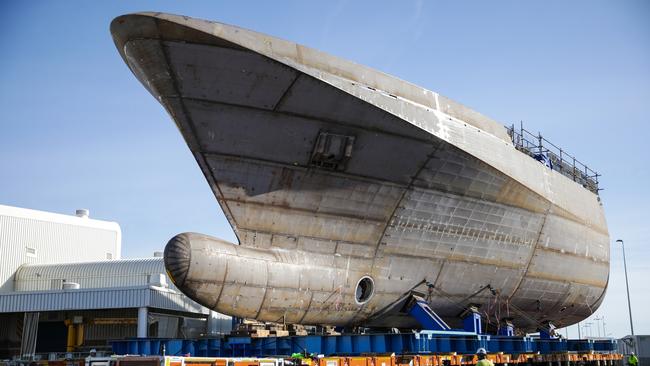
The federal government should be applauded for not doubling down on the sunk costs it put into the submarines deal with France’s Naval Group, with the about face making sense for both national security and industrial reasons.
The risk is that we now repeat the mistakes of the very recent past, and become a glorified assembler of whichever nuclear submarine we end up buying.
The French deal was problematic from the start.
How could a deal characterised as the “contract of the century” by the French also fulfil the same role for Australia, and more specifically the Osborne shipyards in South Australia?
With tens of billions on offer over a few decades arguably it could be both, but for those sitting on the French side of the table – the implementation team apparently being swapped in to replace the bid team post-win – the motivation to keep workers on their home turf in gainful employment would be undoubtedly strong.
Another serious issue, if a recent submission to the federal government from the newly formed Australian Sovereign Capability Alliance (ASCA), based on research from Flinders University, is to be taken at face value, is that “there are no nationally agreed definitions of terms such as ‘Australian work’, ‘Australian industry content’ and ‘sovereign capability’.”
While the colloquial meanings of these phrases is obvious, when you’re slicing and dicing billions in taxpayer dollars, defining whether paying a foreign prime’s local subsidiary qualifies as “local content”, for example, becomes important.
The beauty of the defence monopsony, from an industry perspective, is that you should have a virtually guaranteed, long-term revenue stream, allowing businesses to invest with certainty.
While industries such as vehicle manufacturing – itself arguably a vital sovereign capability – have to compete in an increasingly crowded market, defence suppliers, if the right long-term procurement plans have been put in place by government, should be able to envisage a secure, long-term growth path.
The open secret about Silicon Valley is that its roots lie in the US military-industrial complex, with billions of dollars in defence spending flowing through companies set up by the brightest of minds California’s colleges could serve up following World War II.
The early iterations of the internet itself came out of research funded by the Defense Advanced Research Projects Agency, and the academic and funding environment provided by defence was the springboard for the tech boom of the past two to three decades.
It’s an example which bears replicating.
Our own government has a stated desire to be self-sufficient in defence, with 10 “Sovereign Industrial Capability Priorities” (SICPs) articulated in its Defence Industrial Capability Plan.
The second of these (in no particular order) is to have a “continuous shipbuilding program”, which certainly has an asterisk next to it at the moment.
Nova Systems chief executive Jim McDowell argued in a column published by News Corp Australia earlier this year that we have already ceded the chance for a leading position on many SICPs and in some areas the best we might hope for in return for our spending is jobs and investment.
And even from a layperson’s perspective, an Australia with competitive skills across all 10 SICPs – including aerospace maintenance, small arms design and manufacture, phased array radar capability and submarine maintenance and technology upgrades – does seem ambitious.
But the fact that indecision and a lack of organisation from successive governments means we’re playing catch-up shouldn’t mean we throw our hands in the air and accept that we’re in most cases simply a customer.
Lessons can be taken from other countries such as the US, which has strict rules around who can own and run defence suppliers.
Intellectual property is closely controlled and genuine investment and skills development is demanded of companies on the receiving end of the US government’s formidable largesse.
Demanding real local investment from big-spending programs such as the AUKUS submarine deal, and providing a long-term procurement program which provides certainty for existing local suppliers would be a start.
And in the end, it’s important to keep in mind that this is about much more than industry development.
It would be a wonderful world in which defence spending was only about jobs and economic benefit, but should we find ourselves in a situation where they need to be used in anger, having the local ability to build, maintain and repair our assets becomes rapidly much more than an academic pursuit.
Australia has sadly let its industrial base wither over recent years, and it’s a long path back to any sort of real sovereign capability in many sectors – let’s not mention fuel refining.
The dominance of financial and commodity stocks at the top tier of our markets is testament to how lazy our industrial and research policy settings have been.
While it might not be palatable to some, a sensible, long-term defence spending plan with a real commitment to local industry could be the cure for our industrial and technological malaise.





Defence procurement should present an almost perfect environment to build a sustainable industrial base, but somehow we continue to manage to turn a silk purse into a sow’s ear and in doing so line the pockets of large overseas companies to the detriment of local firms.